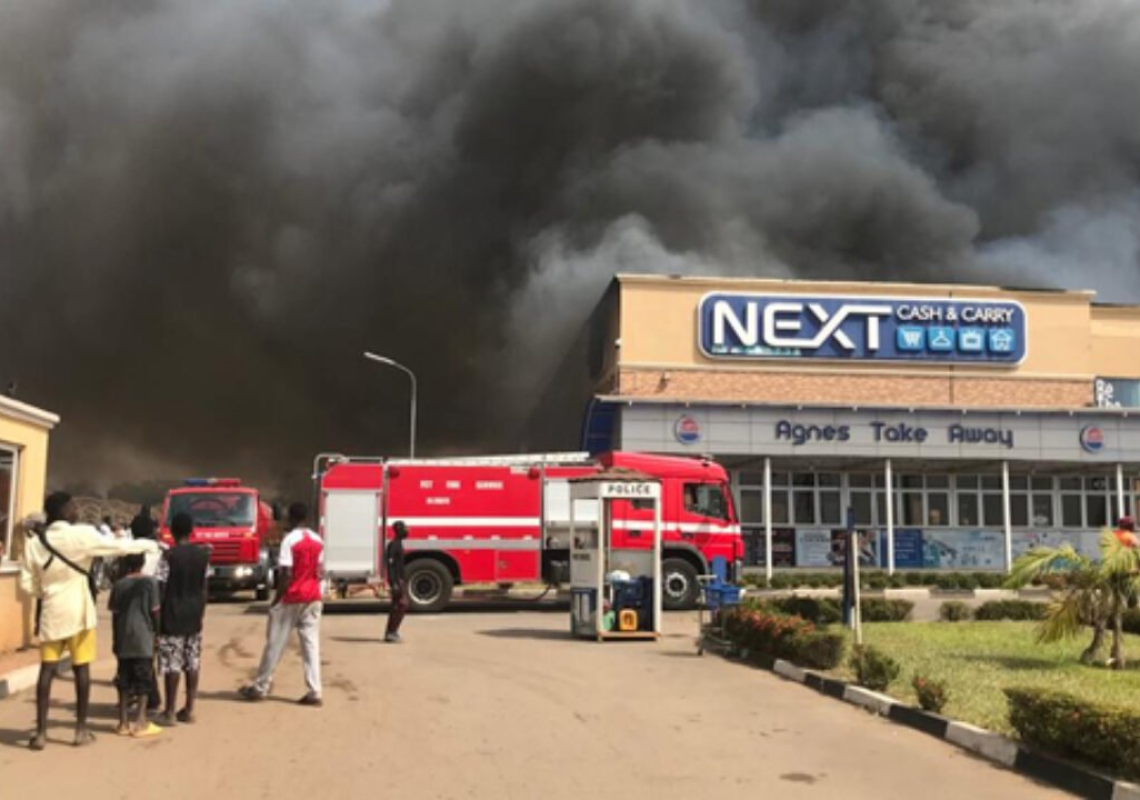Published
on
By
By Adedapo Adesanya
The Federal Capital Territory Emergency Management Agency (FEMA) has called for the review of the Fire Service Act of 1963, in order to empower the agency to meet up with contemporary realities, saying the frequency of fire incidents was becoming alarming.
The Director-General of FEMA, Mr Abbas Idriss, made the call in a statement issued on Tuesday in Abuja.
Mr Idriss said that the act had become obsolete, thus limiting the powers of emergency agencies in the discharge of their duties.
While stating that the law must be reviewed in the interest of public safety, he queried: “Is there any law that empowers firemen to appraise a building from the beginning of construction to the end?”
Mr Idriss said that in the FCT, emergency agencies relied on the Urban and Regional Planning Act to carry out enforcement.
According to him, an average of 5 fire incidents are recorded daily in the FCT, noting that the frequency of fire incidents was too high.
He noted that most of the fire incidents were avoidable, but could be traced to carelessness or willful acts.
The FEMA boss appealed to FCT residents to dial the toll-free number 112 in case of anything strange or unusual.
Recently, a fire had broken out in Abuja City destroying the property and investments of many businesses in the mall, spurring outrage from Nigerians who lamented the lateness of the emergency management team.
A few days ago, a fire outbreak was recorded at the Next Cash and Carry in Abuja, destroying properties in the process. The mall is said to be owned by the former Governor of Anambra State, Mr Peter Obi.
Katsina to Totally Lift Ban on Telco Services in January 2022
IDP Camps Residents Laud Airtel’s Distribution of Palliative Packs
Adedapo Adesanya is a journalist, polymath, and connoisseur of everything art. When he is not writing, he has his nose buried in one of the many books or articles he has bookmarked or simply listening to good music with a bottle of beer or wine. He supports the greatest club in the world, Manchester United F.C.
Pingback: Abuja Records Average of 5 Fire Incidents Daily—FEMA | Business Post Nigeria – Business Post Nigeria – E-Meds Shop
Published
on
By
By Adedapo Adesanya
The Katsina State Government says it will lift the ban on telecommunication services in the remaining seven affected local government areas (LGAs) before the end of January 2022.
The governor of the state, Mr Aminu Masari, disclosed this in Katsina, urging residents to do their best to protect their areas from bandit attacks.
Business Post had reported that recently, the state government lifted the ban on telecommunication services in 10 out of the 17 LGAs in the state which hitherto suffered from banditry.
He commended the efforts of all security agencies, especially vigilance groups for fighting bandits.
Mr Masari noted that the vigilantes travel from one community to another with the aim of protecting the communities.
The governor also advised people to defend their communities and to also give the securities all the necessary support, especially by providing them with correct information on criminals.
He also urged the people in the various communities to support the local vigilante groups with the necessary weapons so that they could defend them in the event of an attack.
Recall that recently, the governor said that banditry must be defeated collectively across the affected northern states before 2023 when the tenure of the various administrations will come to an end.
The governor, who gave the assurance while signing the state’s 2022 approved appropriation bill, said no going back in the fight against bandits.
According to him, the bandits are well known in their communities and should be fished out.
“We must prepare to fight back as individuals, to fight the bandits because they are evil and they represent evil. We should not retreat in this fight.
“We took over under serious threat of security in 2015, and by God’s grace, we will not hand over this country to the next generation of leaders under this condition. We must restore normalcy.
“We inherited the government with the security challenges and we must end it and hand over the state to our successors without the same problem.
“We must control and dominate our environment.
“There are two advantages that we have, numbers and technology. When you put the two together, we will restore normalcy. It is not beyond us to do that,” Mr Masari said.
Published
on
By
By Modupe Gbadeyanka
Some residents at the Ugha Internally Displaced Persons (IDPs) camp in Benue State were ecstatic as they received their food palliative packs from leading telecommunications services provider, Airtel Nigeria, under its 5 Days of Love annual Christmas initiative.
Airtel had announced plans to distribute 1,000 palliative packs to five select IDP camps in five states across the country over a period of five days during a held virtual press conference.
Expressing heartfelt gratitude during the kick-off of the programme in Ugha IDP Camp, Makurdi, the state capital, one of the camp residents who received their palliative food pack commented, “We want to thank Airtel for what they have done for us, we really appreciate and we are praying to the almighty God to give them wisdom so that they can share this to others who are in need.”
“We want to thank them so much for this wonderful gesture they have shown to us today.
“And we pray that when they depart here, going to their various destinations, God should guide them safely to where they are going in good condition,” he concluded.
Speaking at the distribution, the Zonal Business Manager, Benue, Airtel Nigeria, Clinton Alimi, reaffirmed Airtel’s commitment to making life better for Nigerians despite the pandemic currently ravaging the country.
“On behalf of us at Airtel, I am happy to be here to start off this year’s edition of our annual 5 days of Love Christmas initiative with the distribution of palliative food packs.
“For the past six years, Airtel has staged 5 days of Love across 20 cities and has fed well over 20,000 Nigerians through this programme. Despite the challenges that COVID-19 brought upon us, we still have many things to be grateful for and thankful for.
“Airtel is committed to touching lives of the underprivileged across the society, as a critical stakeholder in Nigeria, we are also passionate about uplifting the less privilege and providing to the vulnerable as this aligns with our overall CSR of touching lives and improving the standard of living of the less privilege,” Alimi concluded.
On Tuesday, December 14, 1000 palliative packs were distributed in Kasaisa IDP Camp in Damaturu, Yobe State while on Wednesday, December 15, residents of IDP camp in Ekiti State received palliative packs. On Thursday, December 16, the programme was held in Anka, Zamfara State, while distribution concluded at the IDP Camp in Ekende, Ogoja, Cross Rivers State on Friday, December 17.
The Airtel 5 Days of Love programme, which is in its 7th edition, is designed to identify with less privileged persons as well as support the downtrodden in communities where Airtel operates.
Through the programme, Airtel says it is uplifting the less privileged and providing support for the vulnerable as this aligns with its overall CSR theme of touching lives and improving the standard of living of the less privileged.
Published
on
By
By Adedapo Adesanya
Nigeria has ranked seventh in the latest Africa Visa Openness Index published this month by the African Development Bank (AfDB) and the African Union Commission.
The index, which has been published since 2016, measures the extent to which African countries are open to visitors from other African countries. It also analyses each country’s visa requirements to show which countries on the continent facilitate travel to their countries.
For each country, the index calculates the number of African countries whose citizens must obtain a visa before travelling there, the number of countries whose citizens may obtain a visa upon arrival, and the number of countries whose citizens do not need a visa to enter.
The index also tracks changes in the countries’ scores over time and then analyses how policies earmarked for freedom of movement across the continent are evolving.
Last year, Uganda was ranked seventh on the continent just behind Seychelles, Benin, The Gambia, Senegal, Ghana and Rwanda but this year, Nigeria upstaged Uganda.
Overall, Africa is almost evenly split between countries with a liberal visa policy and those that partially restrict entry from other African states. A quarter of African countries welcome some or all African visitors visa-free; another quarter, roughly, permits some or all African visitors to obtain a visa on arrival.
This year’s index found that the onset of the COVID-19 pandemic substantially impacted the free movement of people around the continent as governments temporarily reversed their liberal visa regime partly in reaction to the COVID-19 pandemic.
Yet, despite the COVID-19 crisis forcing many African countries to introduce measures to curtail travel, 36 countries have improved or maintained their Visa Openness Index score since 2016 when the visa openness rankings were introduced by the AfDB.
The report mentions Namibia, Morocco, and Tunisia as countries that have made the most progress in visa openness.
Still, high visa fees and cumbersome application processes remain a major bottleneck for travellers in Africa, especially business people. For instance, the average visa fee for Africans travelling on the continent is $63. The visa fees depend on the length of stay and they can range anywhere between $12-250 while the average processing time for issuing a visa can range anywhere between 1-10 days.
Speaking on this, Mrs Monique Nsanzabaganwa, the Deputy Chairperson at the AU Commission noted that the Africa Visa Openness Index report has revealed a real danger of Africa losing the gains in liberal visa policies that the continent has realized over the years.
“A lot more can be done to reduce bureaucracy, address the security implications for the free movement of people agenda, and simplify the visa process so that Africans have a smoother travel experience,” she said.
Experts at both the AfDB and the Africa Union Commission say in order for Africa to recover and rebuild, it is important that the governments combine efforts not only to expand access to vaccines but also ease the movement of people on the continent.
“Making vaccines more accessible and easing the movement of people is essential to kick-start trade and investments in tourism, travel-related industries, and other equally crucial sectors, such as agriculture, energy and manufacturing,” said Mr Khaled Sherif, the AfDB Vice President Regional Development, Integration and Business Delivery.
“By supporting the free movement of people, we make it easier for Africans to do business in Africa. Free movement of people, especially workers, could help plug skills gaps while enabling countries to fix skills mismatches in their labour markets,” said Mr Jean-Guy Afrika, the Officer-In-Charge of the Regional Integration Coordination Office at the African Development Bank.
“We need the visa regime to be able to help people move around. We also need the right customs regime and the right border automation control and so on, to support the movement of people, goods and services for the development, growth and sustainability of the African economy as we begin to recover from the pandemic,” said Mrs Adefunke Adeyemi, the Africa Regional Director, at the International Air Transport Association (IATA).
Davos was Different this year
Kwara Disburses N1.7b For Projects
Lagos Seals Western Lodge Hotel In Ikorodu
How To Link Your MTN, Airtel, Glo, 9mobile Lines to NIN
How To Identify Fake Naira Notes
Sort Codes of GTBank Branches in Nigeria
NSE Market Capitalisation Sheds N76b as Sell‐offs Persist
FAAC: FG, States, LGs Share N655.18b in January
Copyright © 2021 BusinessPost






